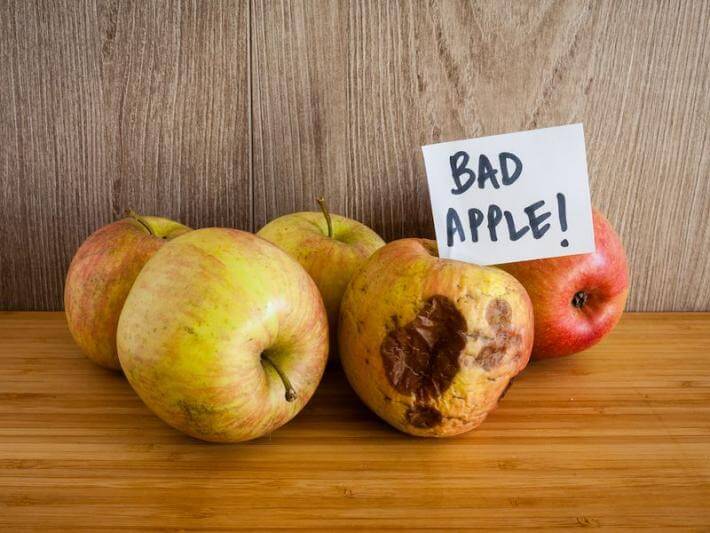What Is That Saying About ‘Bad Apples’ Again?
People sometimes seem to forget about the second part of the “bad apple” saying.
Mignon Fogarty

Listen
What Is That Saying About ‘Bad Apples’ Again?
The complete saying is “one bad apple spoils the whole bunch,” and it means that you need to get rid of bad apples or the problem will spread.
I’ve been hearing people talk about “bad apples” a lot lately, so it seems like a good time to look at this idiom—what it means and where it came from. Along the way, I also found some surprising history about the word “apple” itself.
What do we mean when we talk about ‘a few bad apples’?
First, we’ve been hearing about bad apples because it’s a way that people try to say a problem isn’t widespread. For example, when a police officer is caught doing something horrible, people who defend the police department often say that one officer was just a “bad apple” or sometimes a “rotten apple.”
And if a few more police officers are caught violating people’s rights, defenders might broaden their defense to say it’s just “a few bad apples,” implying that most of the officers are still good.
The complete saying is ‘one bad apple spoils the whole bunch.’
It’s a troublesome phrase to use in that context though, at least historically, because the full idiom has a second part about spoiling the whole bunch. It usually goes something like “one bad apple spoils the whole bunch” or “a few bad apples spoil the whole barrel.” So instead of suggesting that one bad apple is an isolated problem, the idiom means that if you consistently have bad apples hanging around, the problem is going to spread.
The origin of the ‘bad apples’ idiom
Some sources say the proverb started with Chaucer, who in “The Cook’s Tale” had a character say, “It is better to take the rotten apple out of the bag than to have it rot all the other apples.” “The Cook’s Tale” was written sometime between the years 1387 and 1400, but the character who says that line says he is quoting a proverb, so it’s likely the saying was in use before then.
In fact, the Oxford English Dictionary has the earliest English use of “rotten apple” to mean “a bad person who has the potential to corrupt others” appearing in the year 1340 in a book called “Ayenbite of Inwyt.” That book was a commentary on Christian morality, and it was actually a translation from a book written in French that was published in the late 1200s.
The saying is quite old, and it’s true.
No matter the exact date, we can say with confidence that the saying is quite old. And it’s old because it’s true from a farming and produce perspective.
A bad apple really can spoil the whole bunch
(correction_with_script)
Today, we can just buy a few fresh apples from the store every week, but back in the 1200s, people had to store all the apples from their harvest, and they knew that leaving a moldy apple in the barrel would make the others get moldy faster.
And today, we also know that apples release a gas called ethylene that makes fruit ripen faster. If you want your avocados to ripen faster, put them in a paper bag with an apple. So an overripe or decaying apple will make all the other apples in the barrel ripen faster too—not good if you want to keep them in storage as long as possible.
Farmers knew that they needed to get rid of the bad apples as fast as possible.
A long time ago, ‘apple’ was the name for almost any fruit
Next, here’s something that will surprise you about the word “apple”: Originally, it wasn’t limited to what we think of as an apple today. Instead, in Old English, an apple was any round firm fruit that grew on a tree. For example, it could be what today we call an apple, an orange, or even a pomegranate.
According to Etymonline, in Middle English, “apple” was “a generic term for all fruit other than berries but including nuts.” Dates were called “finger apples” and bananas were called “apples of paradise,” for example.
If you’re reading a document from Old English or Middle English, don’t assume an apple is what we think of as an apple today.
It made me think of words for color, which we talked about a couple of years ago, and how those words also started out covering broad categories and then became more narrow. Like how “white” used to mean what we think of as white today, but it also included the colors gray, and yellow, and silver.
To sum up, if you’re reading a document from Old English or Middle English, don’t assume an apple is what we think of as an apple today.
And if you’re going to talk about bad apples, remember that the whole saying is that a few bad apples spoil the whole bunch.
Image courtesy of Shutterstock.

